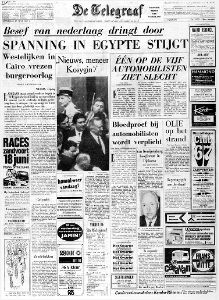About the day » Saturday June 17, 1967Calender converter
Born on Saturday June 17, 1967
- Vanessa KING († 1988)
- Michael Elliott Ebanks († 2007)
- Willem Frans Schets, Vlissingen
- Ann Ollevier, Ieper
- Vincent Renatus Maria Edelbroek, Utrecht, Utrecht, Nederland
- Patrick Jozef Haenen, Hasselt, België († 1974)
- Tineke van Dellen, Leeuwarden, Leeuwarden, Friesland, Nederland († 1967)
- Paul Willem Roelofs, Breda, Noord-Brabant, Nederland († 1996)
- Curtis Meyers, Pella, Marion County, Iowa († 2013)
Died on Saturday June 17, 1967
- Catharina van der Steenhoven (85), Maassluis, Zuid-Holland, Nederland
- Adriaantje Hoftijzer (92)
- Alida Wilhelmina van den Brun (83), Amsterdam
- Anna Mabel Raffensperger (93), fortasse, somewhere in PA
- Baltus Lute (78), Castricum
- Benjamin Arthur van Ningen (64), Lennox, Lincoln County, South Dakota
- Anna Maria HEßELER (69), Eschweiler,52249,Städteregion Aachen,NORDRHEIN-WESTFALEN,DEUTSCHLAND
- Anthonie Burghart (49), Arnhem, Gelderland, Nederland
- Anthonij Johannes Odinot (70), Den Haag, Nederland
- Adriaantje Hoftijzer (92)
Source: Delpher (KB | national library) Newspapers from June 17, 1967 at Delpher
- Amigoe di Curacao : weekblad voor de Curacaosche eilanden
- De waarheid
- Friese koerier : onafhankelijk dagblad voor Friesland en aangrenzende gebieden
- Leeuwarder courant : hoofdblad van Friesland
- Nieuwsblad van het Noorden
- Het vrije volk : democratisch-socialistisch dagblad
- Limburgsch dagblad
- Gereformeerd gezinsblad / hoofdred. P. Jongeling
- De tijd : dagblad voor Nederland
- De Telegraaf
Born on June 17
- 1965 » Dermontti Dawson, American football player and coach
- 1966 » Diane Modahl, English runner
- 1966 » Jason Patric, American actor
- 1966 » Ken Clark, American football player († 2013)
- 1966 » Mohammed Ghazy Al-Akhras, Iraqi journalist and author
- 1966 » Tory Burch, American fashion designer and philanthropist
- 1967 » Dorothea Röschmann, German soprano and actress
- 1967 » Eric Stefani, American keyboard player and composer
- 1968 » Minoru Suzuki, Japanese wrestler and mixed martial artist
- 1968 » Steve Georgallis, Australian rugby league player and coach
Died on June 17
- 1956 » Bob Sweikert, American race car driver (b. 1926)
- 1956 » Paul Rostock, German surgeon and academic (b. 1892)
- 1956 » Percival Perry, 1st Baron Perry, English businessman (b. 1878)
- 1957 » Dorothy Richardson, English journalist and author (b. 1873)
- 1957 » J. R. Williams, Canadian-American cartoonist (b. 1888)
- 1961 » Jeff Chandler, American actor (b. 1918)
- 1963 » Aleksander Kesküla, Estonian politician (b. 1882)
- 1968 » José Nasazzi, Uruguayan footballer and manager (b. 1901)
- 1974 » Refik Koraltan, Turkish lawyer and politician, 8th Speaker of the Grand National Assembly of Turkey (b. 1889)
- 1975 » James Phinney Baxter III, American historian and academic (b. 1893)
Names that were popular for boys in 1967
Names that were popular for girls in 1967
Source: Wikipedia Historical events 1967
- Koningin Juliana (Huis van Oranje-Nassau) was from September 4, 1948 till April 30, 1980 sovereign of the Netherlands (also known as Koninkrijk der Nederlanden)
- In The Netherlands , there was from November 22, 1966 to April 5, 1967 the cabinet Zijlstra, with Prof. dr. J. Zijlstra (ARP) as prime minister.
- In The Netherlands , there was from April 5, 1967 to Tuesday, July 6, 1971 the cabinet De Jong, with P.J.S. de Jong (KVP) as prime minister.
- The Netherlands had about 12.5 million citizens.
- January 23 » Milton Keynes (England) is founded as a new town by Order in Council, with a planning brief to become a city of 250,000 people. Its initial designated area enclosed three existing towns and twenty one villages. The area to be developed was largely farmland, with evidence of continuous settlement dating back to the Bronze Age.
- April 14 » Gnassingbé Eyadéma overthrows President of Togo Nicolas Grunitzky and installs himself as the new president, a title he would hold for the next 38 years.
- May 26 » The Beatles' Sgt. Pepper's Lonely Hearts Club Band is released.
- October 27 » Catholic priest Philip Berrigan and others of the 'Baltimore Four' protest the Vietnam War by pouring blood on Selective Service records.
- November 7 » US President Lyndon B. Johnson signs the Public Broadcasting Act of 1967, establishing the Corporation for Public Broadcasting.
- December 13 » Constantine II of Greece attempts an unsuccessful counter-coup against the Regime of the Colonels.
Weather June 17, 1967
The temperature on June 17, 1967 was between 10.3 °C and 18.8 °C and averaged 14.0 °C. There was 6.9 hours of sunshine (41%). The partly or heavily clouded was. The average windspeed was 3 Bft (moderate breeze) and was prevailing from the north-northeast.

 June 16, 1967
June 16, 1967